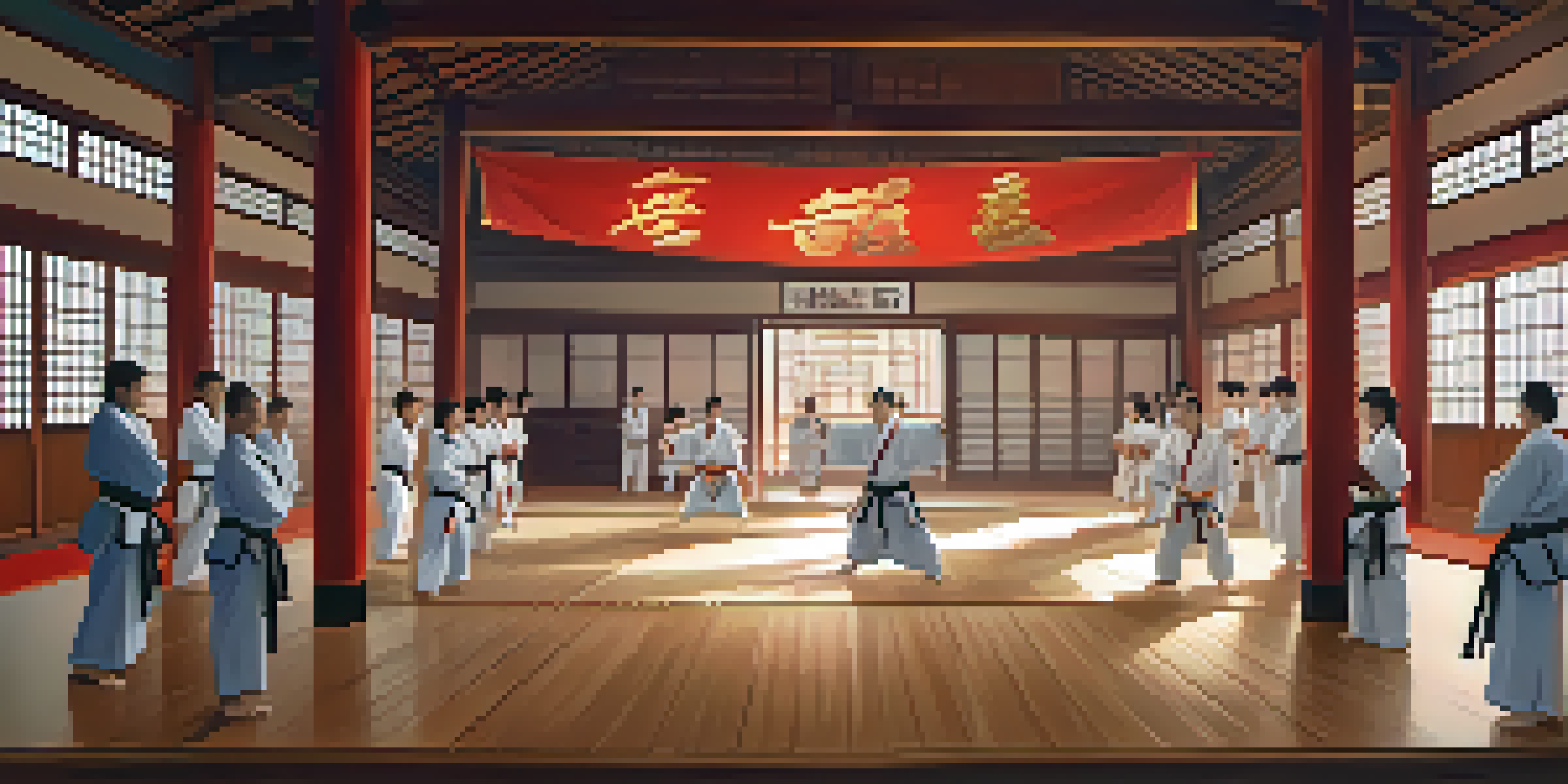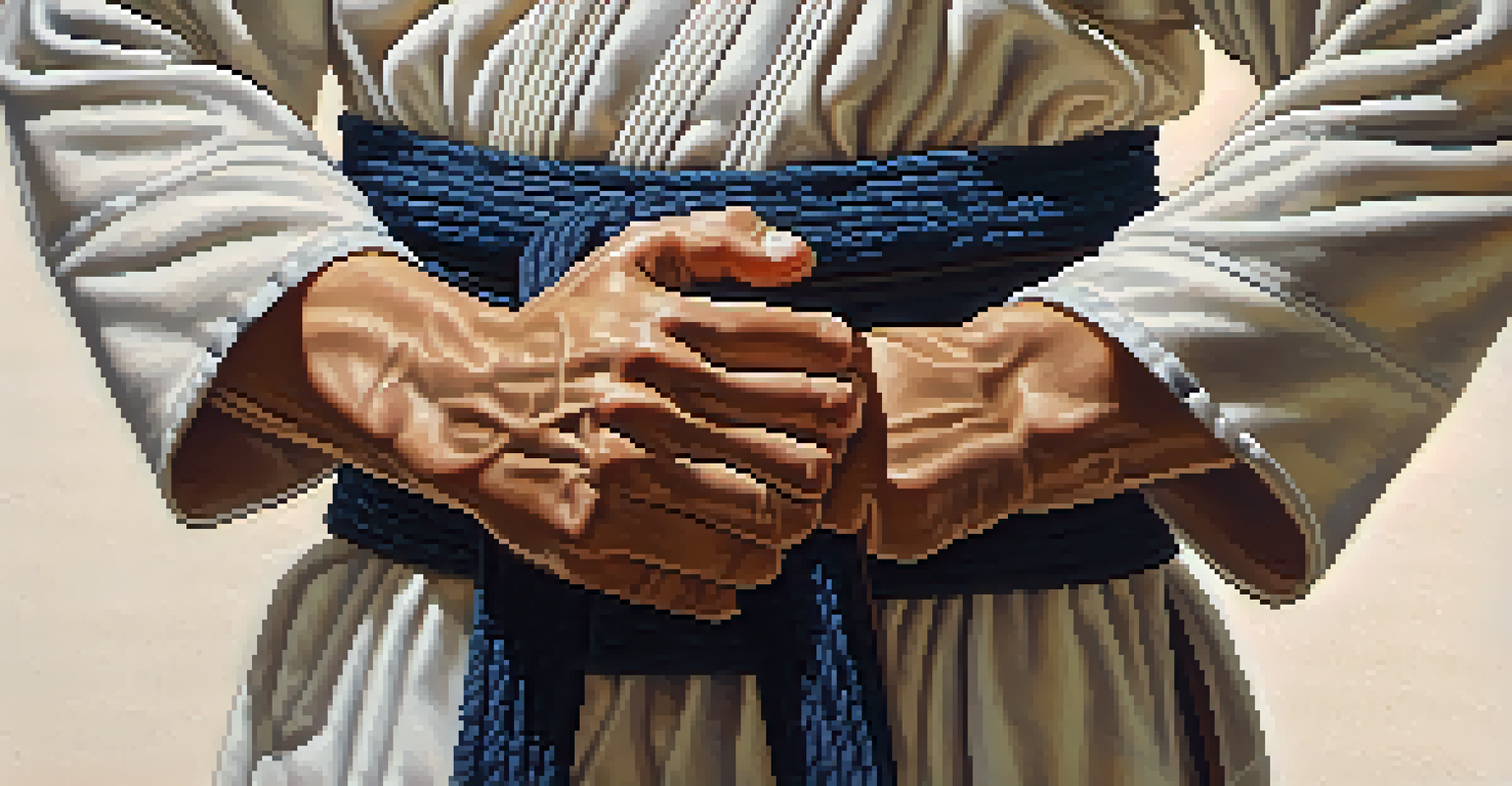The Psychology of Resilience: Insights from Martial Arts

Understanding Resilience in Everyday Life
Resilience is the ability to bounce back from adversity, much like a rubber band that snaps back after being stretched. It's not just about facing challenges; it's about how we respond when things don’t go our way. In our daily lives, resilience can help us navigate personal setbacks, work stress, and even global events that shake our stability.
It’s not whether you get knocked down, it’s whether you get up.
Martial arts practitioners often encounter physical and mental challenges that test their limits, and this experience can be a powerful teacher. For instance, during a tough sparring session, a student learns to remain calm under pressure, which translates to real-world situations where stress levels rise. This connection between practice and everyday resilience is what makes martial arts a unique training ground for mental fortitude.
Ultimately, cultivating resilience is about building a mindset that embraces challenges as opportunities for growth. Just as martial artists learn to fall and get back up, we too can develop our own strategies for overcoming obstacles in life.
The Role of Mindfulness in Martial Arts
Mindfulness, the practice of being present in the moment, is a key component of many martial arts disciplines. When practitioners focus on their movements and breathing, they're not only enhancing their physical performance but also training their mental resilience. This heightened awareness allows them to manage their emotions better and stay grounded during stressful encounters.

For example, a martial artist might find themselves in a sparring match where the stakes feel high. By practicing mindfulness, they can reduce anxiety and maintain clarity in their decision-making. This ability to stay focused amidst chaos is a skill that can be applied in various life scenarios, whether it's a big presentation at work or a challenging conversation.
Resilience Through Mindfulness
Practicing mindfulness in martial arts enhances mental resilience, allowing practitioners to manage emotions and stay focused during stressful situations.
Therefore, incorporating mindfulness into daily routines can significantly boost our resilience. Just as martial artists practice being present on the mat, we too can benefit from taking a moment to breathe and center ourselves when faced with life’s pressures.
Overcoming Fear Through Martial Arts Training
Fear is a natural response to challenges, but it can also be a barrier to resilience. In martial arts, students often confront their fears directly, whether it’s the fear of getting hit or the fear of failure in competition. By facing these fears head-on in a controlled environment, they learn that fear can be managed and even transformed into a source of strength.
The greatest glory in living lies not in never falling, but in rising every time we fall.
Consider a beginner who is hesitant to spar for the first time. As they step onto the mat, they may feel a rush of anxiety, but with guidance from their instructor and support from teammates, they learn to channel that fear into focus. This experience not only builds confidence but also reinforces the idea that overcoming fear is a vital part of personal growth.
As we recognize and confront our fears, we develop resilience that empowers us in our everyday lives. Much like martial artists, we can take small steps toward facing what intimidates us, ultimately leading to greater courage and strength.
Building a Supportive Community in Martial Arts
One of the most significant aspects of martial arts training is the sense of community it fosters. Students train together, support each other, and celebrate each other's successes, creating an environment rich in encouragement and camaraderie. This supportive network can be a crucial element in building resilience, as it helps individuals feel connected and less isolated in their struggles.
Take a moment to imagine a dojo filled with practitioners of varying skill levels. Each member brings their own challenges, and they share their experiences openly. This environment not only allows for personal growth but also reinforces the idea that resilience is often strengthened through collaboration and support from others.
Community Strengthens Resilience
Being part of a supportive martial arts community fosters resilience by creating connections and encouraging personal growth through shared experiences.
Ultimately, being part of a community that values perseverance and growth can have a profound impact on our resilience. When we surround ourselves with those who uplift us, we find the strength to tackle our challenges head-on, knowing we’re not alone.
Setting Goals and Achieving Progress in Martial Arts
Goal setting is a fundamental part of martial arts training, and it serves as a powerful tool for building resilience. Whether it's earning a new belt or mastering a difficult technique, setting clear and achievable goals helps practitioners stay motivated and focused on their journey. This structured approach to progress encourages a growth mindset, where setbacks are viewed as learning opportunities rather than failures.
For instance, a student who struggles with a particular kata may feel discouraged at first. However, by breaking down the skill into smaller, manageable goals, they can celebrate each small victory along the way. This incremental progress not only boosts confidence but also reinforces the idea that perseverance is key to success.
By applying the principles of goal setting from martial arts to our personal and professional lives, we can foster resilience. Setting realistic, achievable goals allows us to navigate challenges with purpose and determination, ultimately leading to greater satisfaction and success.
The Importance of Adaptability in Martial Arts
Adaptability is a core principle in martial arts, where practitioners must learn to adjust their tactics based on their opponent's movements. This skill is critical not just on the mat but also in everyday life, where change is often the only constant. Being able to pivot and adapt when faced with unexpected challenges is a hallmark of resilient individuals.
Imagine a martial artist during a competition who suddenly finds themselves up against a more skilled opponent. Instead of panicking, they draw on their training to analyze the situation and adapt their strategy. This ability to remain flexible and responsive can make all the difference in both competitive settings and life’s unpredictable moments.
Adaptability is Key to Growth
The ability to adapt and adjust strategies in martial arts teaches resilience, preparing individuals to navigate unexpected challenges in everyday life.
Cultivating adaptability means embracing change and viewing it as an opportunity for growth. Just as martial artists learn to flow with their opponents, we too can develop the resilience to navigate life’s uncertainties with grace and confidence.
Applying Martial Arts Principles to Everyday Challenges
The principles learned in martial arts can be applied beyond the dojo, influencing how we approach life’s challenges. Values such as discipline, respect, and perseverance are integral to martial arts training and can serve as a foundation for building resilience in any context. When we embody these values, we create a mindset that thrives in the face of adversity.
For example, a person might apply the discipline they’ve honed in martial arts to stick to a challenging project at work. By fostering a strong work ethic and resilience, they become better equipped to handle stress and setbacks. This holistic application of martial arts principles can lead to more fulfilling personal and professional lives.

Ultimately, the lessons learned through martial arts can empower us to face our challenges with confidence. By integrating these core values into our everyday lives, we not only enhance our resilience but also inspire those around us to do the same.